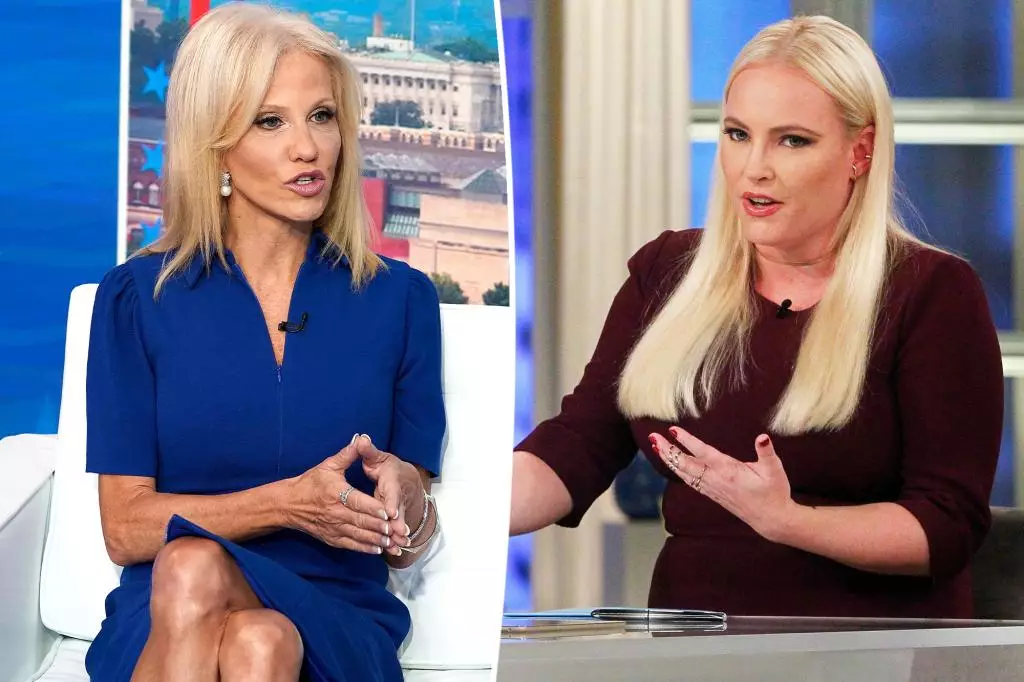In an age where public figures frequently collide in the court of public opinion, few instances exemplify the tensions between personal feelings and professional facades quite like the recent altercation backstage at a panel featuring Kellyanne Conway, Meghan McCain, and Minyon Moore. While these encounters often evoke a sense of intrigue among audiences, the emotional undercurrents and different perspectives add depth to an already compelling narrative.
The Women’s Summit organized by Tina Brown provided the backdrop for this dramatic encounter, featuring influential figures discussing weighty political issues. Following their joint appearance, what transpired in the green room became a microcosm of the contentious political climate in the United States. Conway, previously a Senior Counselor to President Trump, and McCain, known for her outspoken views on “The View,” found themselves embroiled in a confrontation that some observers describe as a battle of wills.
The tensions traced back to previous public comments McCain had made regarding Conway’s marriage to George Conway of the Lincoln Project, branding it “gross” on several occasions. While this commentary may seem trivial, it precisely encapsulates how the political and personal often intertwine among public figures. It adds layers of complexity to McCain and Conway’s relationship, underscoring how personal grievances can taint professional interactions, even in a seemingly benign setting like a panel discussion.
Accounts from witnesses vary drastically, leading to a fascinating dissection of the two women’s exchange. Some allege that after the public discourse, Conway stormed into the green room, clearly agitated, while others insist she approached McCain in a more measured manner, insisting that her comments about Conway’s marriage were inappropriate. Such discrepancies point to the often unreliable nature of eyewitness accounts, especially in emotionally charged situations.
One narrative describes Conway asserting, “You’re disgusting! You hurt people!” creating an image of a heated confrontation fueled by raw emotions. In contrast, others depict Conway as calm but firm, asserting her rights to personal dignity. This divergence in perspectives brings to light the age-old debate about the nature of conflict—whether it arises from genuine indignation or stems from a dimensional understanding of interpersonal boundaries.
As McCain implores Conway, “You’re in my space. I’m uncomfortable,” it evokes a sense of personal violation. One can’t help but consider the emotional toll that public life inflicts on individuals, especially when intertwined with familial legacies and societal expectations. McCain even referenced the pain inflicted by Trump’s derogatory comments about her late father, Senator John McCain, highlighting the emotional stakes involved.
Conway’s assertion, “I’m not Trump! I’m not Trump!” can be seen as her plea to separate herself from past grievances and the actions of a previous administration. This attempt to redefine one’s identity in a fraught political landscape becomes emblematic of a broader struggle as political figures navigate public perception, often relying on personal narratives as a tool to forge their paths.
In the aftermath of the confrontation, Conway’s insistence on her professionalism calls into question the standard by which public figures measure their interactions. While she may view her exchange with McCain as an effort to address a personal grievance, McCain’s perception veers toward a more chaotic spectacle. Such incidents should prompt a reflection on how public figures uphold decorum amid personal strife, and where the lines are drawn between personal grievances and professional responsibilities.
As unraveling narratives intertwine with public perception, what transpired backstage is more than just a spat; it serves as a powerful illustration of how deeply personal emotions intersect with public personas. While public commentary can cut deep, the subsequent confrontations reflect not only personal pain but also the charged political discourse that they inadvertently perpetuate. This incident, like many others, reminds us that in the world of media and politics, the stakes are always higher than they appear, making for an endless well of compelling narratives.

